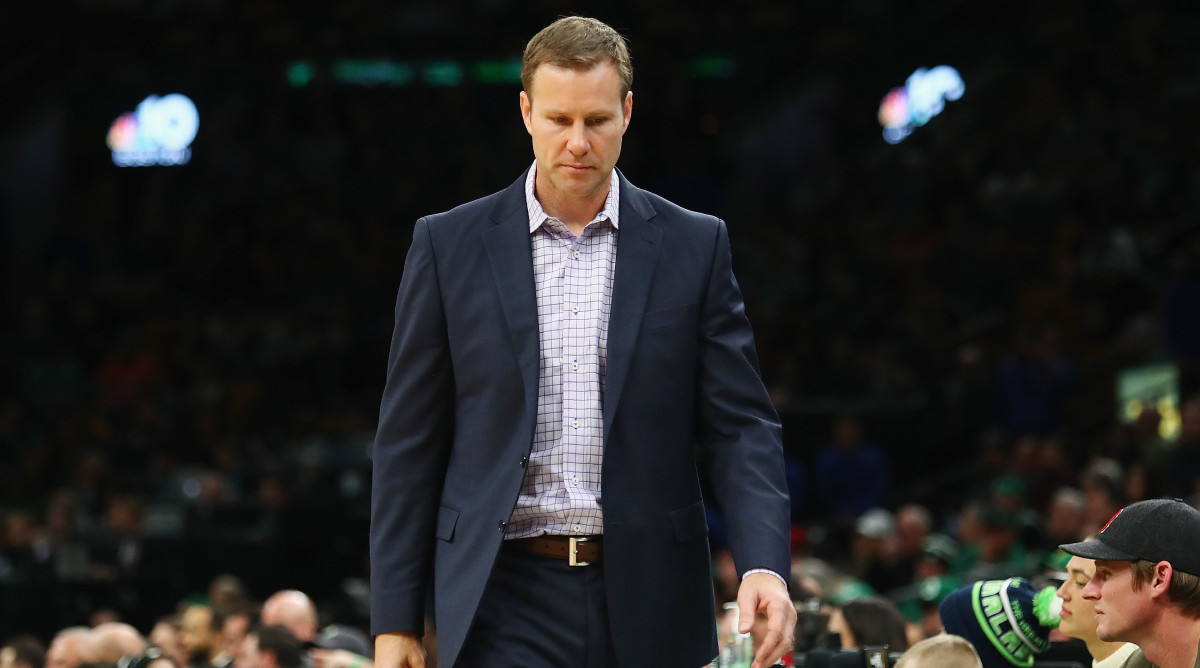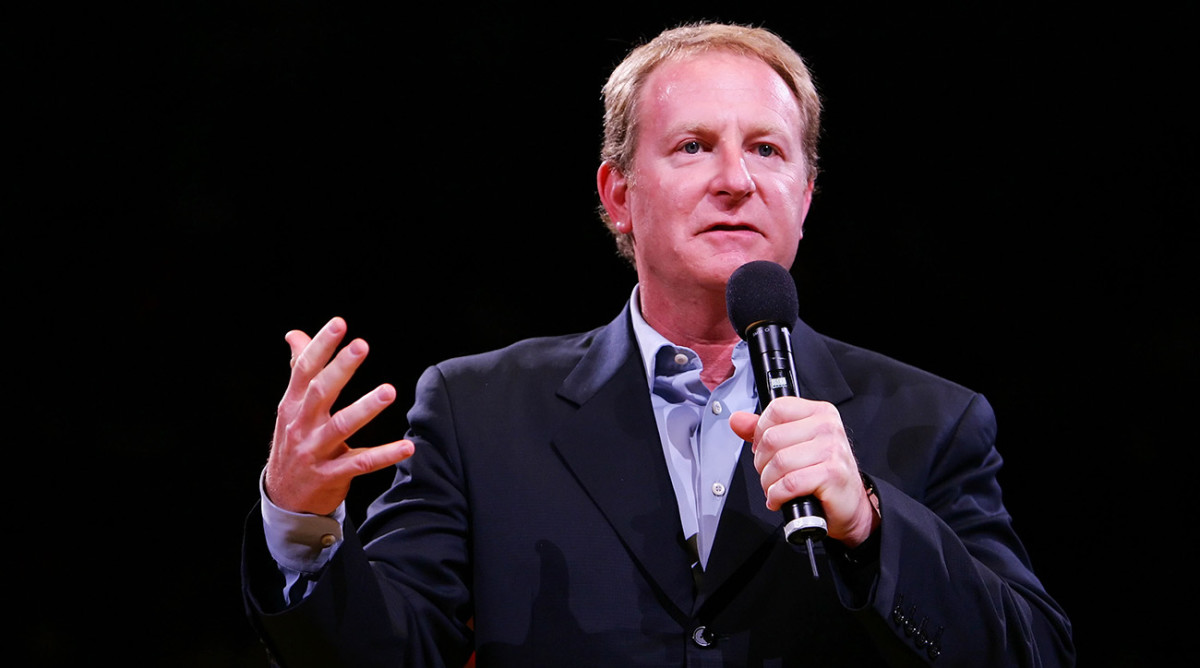Bulls Mutiny, Suns Misery, and the Power of Bad Ownership in the NBA

On Monday morning I was talking to a friend who said, "The beauty of the NBA is that if you’re a dysfunctional franchise, you’re only going to get jokes for a couple of weeks because someone will outdo you." That's a good way to think about the Bulls and Suns.
Last Monday, the Bulls fired Fred Hoiberg. That news gave the rest of the league an excuse to stand back in awe as they considered the awful hand Hoiberg had been dealt over the past few years. From Tuesday to Friday, the Suns lost three games by a combined 56 points. After one of those games Devin Booker had a heated locker room argument with this year’s No.1 pick, Deandre Ayton, who had been benched for Richaun Holmes earlier in the night. In that same Blazers game, Portland was up 25 points by the end of the first quarter. Late in the third, another first round pick, Mikal Bridges, had his own heated argument on the sidelines with first-year head coach Igor Kokoskov.
Then the Bulls re-entered the picture. First there was a 56-point loss to the Celtics on Saturday night, and then came a near-mutiny after new head coach Jim Boylen called a two-hour practice the day after a back-to-back (and the day before Monday night's Kings game). This Bulls team would not have been particularly convincing as triumphant protesters, but that's OK. The almost-mutiny was its own perfectly weird and desperate sideshow that feels completely appropriate for this team. And then Sunday night, there was an ESPN report indicating that Phoenix is preparing to auction off the veteran the team signed to provide stability this season—it's possible this will be the second time in two months that James Jones and the Suns help LeBron James fill out his Lakers roster.
MAHONEY: Bulls Run Out of Patience on Hoiberg
In the middle of it all, the focus should be on ownership. There a are dozen different things to say about the dysfunction that defines both these teams, but more than anything else, each team is its own testament to the power of terrible ownership.
In recent years it's become fashionable among NBA fans to celebrate good ownership and praise the foresight of people like Joe Lacob or Wyc Grousbeck. Some of that makes sense. A good owner spends money in all the right places, hires the right people, stays out of the way. Good owners are important. But a good owner can only do so much; at the end of the day, they are all dependent on once-in-a-generation good fortune to ever win anything that matters. The path to success is the same for any of them. Bad owners, meanwhile, can ruin a team in so many different ways.
Consider the Bulls and Hoiberg. In successive seasons in Chicago, he was working with the following foundations:
• Joakim Noah, Pau Gasol, Jimmy Butler, Derrick Rose
• Jimmy Butler, Rajon Rondo, Dwyane Wade, Nikola Mirotic
• Lauri Markkanen, Kris Dunn, Zach LaVine, Justin Holiday
• Lauri Markkanen, Zach LaVine, Wendell Carter Jr., Jabari Parker
In his first season he was asked to exhume those old Thibs stalwarts and contend at the top of the East. This season, after one year building toward the future, the Bulls expected to compete in the East. To help achieve that goal, Chicago signed one of the worst defenders in the league to join a nucleus that was already doomed on that end. "They don’t pay players to play defense," Jabari Parker said during his first media tour this summer.

Hoiberg was more likely to have a psychotic break than make a playoff run with these players. But through it all, the most amazing thing about the Bulls is that the architects of these rosters have remained completely immune to any kind of accountability. "Jerry Reinsdorf has always said," Peter Gammons wrote in the year 2000, "he'd trade all his Bulls championship rings for one World Series ring. I don't know if he really would, but everyone who works here knows this: that what he wants most in his professional life is to win the World Series." Wherever the Reinsdorf family's focus is, it can't be on the Bulls.
Reinsdorf and his son, Michael, continue to empower general manager Gar Forman and VP John Paxson, and it's almost like the results don't matter. Hoiberg, himself, was hand-picked by Forman and Paxson to succeed Tom Thibodeau and lead the team into a new era. They spent several years lobbying behind the scenes to replace a good coach (Tom Thibodeau) with Hoiberg. When that experiment ended in disaster, Hoiberg's firing should have been its own indictment of the people who hired him. It's not clear that anyone cares.
Now the team is left with Boylen, who explained Monday morning, “My job is to push players out of their comfort zone. That’s what the Reinsdorfs are paying me for.”
MAHONEY: First-Quarter NBA Awards
Boylen is making less than $1 million on a contract that continues through next season, while Hoiberg's due close to $5 million next season. If the Bulls continue to descend into madness, are we positive that Chicago will hire someone else and risk paying the salaries of three coaches at once? Keep in mind, this is the team that still ranks as one of the most profitable teams in the league and yet struggled to get to the salary floor last season. Likewise, 29 of 30 teams sent a scout to last June's NBA Global Camp, but the Bulls reportedly refused to pay the $10,000 fee the league charged teams to subsidize expenses. Two years ago, the same night they traded Jimmy Butler and settled on a "new direction" to rebuild, the Bulls sold the 34th pick in the draft for $3.5 million from the Warriors.
In any case, Boylen has plenty of support from everyone but his players. "Jim is our head coach," Paxson said last week, "and we expect him to be our head coach going forward, and we’re going to give him every opportunity to succeed here.”

In Phoenix, Sarver's management has been infamous for years, and the results have only gotten worse in recent seasons. The Suns have had 12 first round picks in the past six drafts and only three of those players figure to be a long-term starter anywhere in the NBA (Ayton, Booker, and possibly T.J. Warren). The team is on its third coach in three years, the Suns fired GM Ryan McDonough in September, and there's no clear path to building any kind of sustainable success going forward.
In each of the past two drafts, the Suns appeared to decide on their lottery pick several weeks in advance. It's too early to worry about Ayton, but midway through year two, early returns on Josh Jackson are not particularly promising. In drafting those two players—with Sarver rumored to have heavily influenced the Ayton choice—the Suns passed on Jaren Jackson, Jr. and Luka Doncic, not to mention reportedly turning down a Kyrie Irving trade in 2017 and a chance to draft De'Aaron Fox to play next to Booker. The Fox situation was particularly Suns-y. The team never gave serious consideration to Fox because Eric Bledsoe was in place as the starter next to Booker. Six months after the draft, Bledsoe demanded a trade with his "I don't want to be here" tweet. Twelve months after trading Bledsoe, the Suns still don't have a starting point guard.
For his part, Sarver claims he's become a better owner since the Nash era. "I think over time," he said in 2017, "I learned more about the business. I’m more comfortable understanding it. I think I’m a better owner today. I know what we need to do to get back to that [contending] position." This September, before the Suns started the season 4-23, Sarver said, "For me, the switch has flipped and it’s now time to start figuring out how to win."
Like Boylen in Chicago, Sarver fired Hornacek and opted to replace him with one of the most affordable head coaches in the NBA (Earl Watson) as his team tried to develop a roster full of lottery picks. After firing McDonough in December, he promoted from within instead of hiring an outsider to takeover the GM role. Although on that front, it's not clear how much a new hire could actually change. As Charles Barkely said in an interview last year, "I want to make it perfectly clear that Robert Sarver has always treated me great. We haven’t had a lot of interaction, but he’s always treated me great. But from people who have worked for the Suns, and talking to some of these coaches, Robert wants to make all of the decisions. He won’t give control to the people who work for him. ... He hires them but he won’t let them do their jobs. That’s his reputation, and I’ve got to take their word for it."
ROLLINS: Stephen Curry and the Warriors Are Back on Track
The symmetry of the Suns and Bulls incompetence is pretty wonderful, and it speaks to the various ways a bad owner can poison everything. In Phoenix, Sarver is too hands-on and the plan changes every other month. In Chicago, the Reinsdorfs don't appear to care that there hasn't been a coherent plan in almost a decade. Neither team is in any hurry to spend money solidifying the infrastructure of the organization, and both will reap the benefits of NBA revenue sharing at the end of the year. In June, they will probably find themselves in the top five of the draft all over again, with fans hoping that a 19-year old can somehow change all of this.
Both the Suns and Bulls should be so much better than what they have become. Chicago is the third-biggest market in America and the Bulls have one of the best fanbases in all of sports. Building a sustainable winner really shouldn't be that complicated. Until the past decade, Phoenix has been one of the most successful small market teams in NBA history. From 1975 to 2010, the Suns made the playoffs in all but six seasons, and many of those teams were adored by fans all over the league. Alas, Steve Nash is gone, and so is Michael Jordan.
Instead of Hall of Famers, there are only the Reinsdorfs and Sarver. They are currently the NBA's two best reminders that sometimes focusing on players and front offices can only take us so far. When it's time to explain a 50-point loss or a locker room mutiny or a team that's been in the lottery for a decade, the answer always starts at the top.
